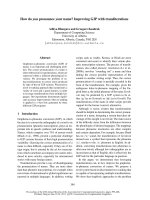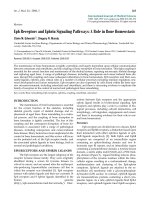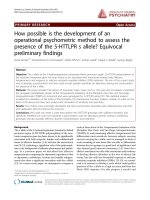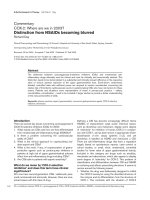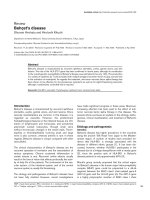Báo cáo y học: "How may you help me" pps
Bạn đang xem bản rút gọn của tài liệu. Xem và tải ngay bản đầy đủ của tài liệu tại đây (42.25 KB, 2 trang )
Genome Biology 2005, 6:111
comment
reviews
reports
deposited research
interactions
information
refereed research
Comment
How may you help me?
Gregory A Petsko
Address: Rosenstiel Basic Medical Sciences Research Center, Brandeis University, Waltham, MA 02454-9110, USA.
E-mail:
Published: 27 May 2005
Genome Biology 2005, 6:111 (doi:10.1186/gb-2005-6-6-111)
The electronic version of this article is the complete one and can be
found online at />© 2005 BioMed Central Ltd
The road to hell may be paved with good intentions, but if
you're looking for the entrance ramp, my current bet is that
it was the invention of the self-service gas (petrol) station.
Thanks to this exciting development, touted as a boon to the
time-strapped consumer, motorists can come into direct
contact with carcinogenic fumes while handling one of the
most explosive, flammable materials ever created. Self-
service gas stations have also increased the profits of the
automotive repair industry, since no one ever checks their oil
or tire pressure anymore. The phenomenon has led to a
curious linguistic paradox: such gas stations are still referred
to as ‘service stations’, even though service is precisely what
you can’t get at many of them. Self-service is outlawed at gas
stations in New Jersey, however, proving something I’ve sus-
pected for a long time: that the US would probably be a
better country if the Mafia just ran it overtly.
Merging onto the Hades Highway, we next encounter the
Automated Teller Machine (ATM), a device ingeniously con-
structed to make it easier for banks to charge you extra for
something they used to do for free, namely giving you your
own money. When the only way to withdraw or deposit
funds was to enter the bank and talk to a human being (the
non-automated teller), such service was provided for free.
With the advent of the ATM, banks quickly realized that
most people would primarily use such machines to spare
themselves the inconvenience of traveling to the bank from
wherever they were, so they began charging a fee for using
machines that were not actually located at one of their own
branches. In other words, as soon as they recognized that
remote ATMs were helping consumers, banks started levying
a tax on the benefit. It wasn’t enough that the bank was
already making two or three times more interest on your
money than they were paying you for the privilege of letting
them use it; they had to take a cut off the top as well. (Please
note that both the self-service gas station and the automated
teller machine have saved their respective businesses vast
amounts of money in personnel costs. In the case of the
ATM, the money that banks made by having fewer actual
tellers apparently wasn’t enough for them.)
Perhaps the center lane on the tollroad to perdition is the
self-service check-out kiosk that many supermarkets - and
increasing numbers of other large chain stores - have now
introduced. Bad enough that you have to take your groceries
off the shelf, put them into your cart, take them out of the
cart to be scanned, and when you get them home, unload
them again; now you can also have the pleasure of scanning
them yourself and, after paying for them, putting them into
bags yourself. The grocery stores are saving bundles of
money on the checkers and baggers they don’t have to hire
(about 2.5 per kiosk), but as far as I can tell this hasn’t trans-
lated into lower food prices anywhere.
I see no end to this trend of offloading onto the consumer
things that companies used to do for us. Airlines now ask us
to check ourselves in at automated kiosks when we get to the
airport, and are trying to get us to book our own flights online
so they don’t have to hire people to do it for us over the
phone. And those maddening telephone menus that ask you a
million stupid questions and give you a billion useless options
when you call for service or information are simply another
way of having the customer replace the person who used to
ask those things and make decisions about where to route the
call. The number of retail kiosks is expected to grow by over
60% worldwide in the next three years. The fast-food sand-
wich chain Subway is experimenting with kiosks that take
orders and accept payments (they still have human employ-
ees to actually make the sandwiches but probably will soon
ask us to do that too). Self-service medicine is doubtless next,
as governments and insurance companies realize they can cut
costs by having us diagnose our own illnesses (“if you have a
temperature over 101°F, press 1; if you are comatose, press
2”); perform our own surgery (“please place removed body
part in bagging area”) and, if we mess up, sue ourselves for
malpractice (“to cross-examine yourself, please speak clearly
into the microphone”).
But what drives me crazy is the sheeplike way consumers are
taking this abuse. Surveys show that self-service is generally
popular, even though numerous studies have demonstrated
that it doesn’t save the customer any time (in fact, in some
settings, such as supermarkets, it’s actually slower than
being served by a person, partly because the self-service
machines seem to screw up so frequently) and hasn’t led to
lower prices. I think people believe that it’s faster, or ought
to be (and, to be fair, in the case of the ATM it really is more
convenient), but I bet one of the main reasons they favor it is
the same reason so many believe driving their own car is
safer than flying, despite decades of evidence that it’s not:
the sense of being in control. Most of us have had so many
bad experiences with service personnel over the years that
we harbor the illusion that doing things for ourselves is
faster and better, even though it’s often neither. Of course, as
companies reduce staff thanks to us doing their work for
them, it becomes even harder to find a service person when
you really need one - for example, if you want to do some-
thing more complicated than these inflexible machines are
programmed to handle. This business of my doing things
employees should be doing has gotten so pervasive that it’s
starting to make me paranoid (OK, more paranoid than
usual): I keep imagining that one day soon I will walk into a
store and a smiling staffer will greet me with a cheery “Good
morning, Sir. How may you help me?”
Still, I was coping reasonably well until a couple of years ago,
when I found that the same virus had started to infect my
professional life. The first symptom was when genomics
journals - ahead of the curve in adopting internet technolo-
gies - began demanding that I fill out an online form every
time I reviewed a manuscript or even declined to do so. In
other words, I was having to enter my information into the
editorial database, exactly the job that the editor used to do.
Soon, all journals began doing this, leaving me to wonder: so
just what is it that editors do now? I suppose they could
spend their time reading the reviews and making decisions,
but some of the treatment of my own manuscript submis-
sions (not to mention some of the stuff that’s gotten pub-
lished when I said shouldn’t be) leads me to wonder if
they’re even doing that. Maybe they’re just sitting around
congratulating themselves on having gotten the scientists to
do so much of their work for them. I’ve been ignoring as
much of this as possible, usually just sending in my reviews
or acceptance/decline-to-review by e-mail, although I
increasingly feel like I’m trying to stand against a hurricane.
But the last straw as far as I’m concerned has come from the
funding agencies. Not only have they started demanding that
we submit parts of our grants electronically, thereby saving
their administrators the trouble of entering that information
into the grants databases; in some cases they have been
insisting that we submit the entire grant electronically, as
well as sending in paper copies to save them the trouble of
preparing those. The US National Science Foundation does
this, using an ironically named system called FastLane,
which in its early incarnation (it’s better now) was so buggy
that it took me longer to submit one grant than it did to write
it (it was only a short proposal but I’m not exaggerating).
And I can’t ignore such demands because, well, we’re talking
about the funding agencies here for goodness’ sake, and no
one can afford to alienate them. Their gleeful offloading of
tasks onto us hasn’t stopped with that, either, because now
when they ask us to review grants, they don’t send those by
mail, they simply e-mail us the file and expect us to print it
out for ourselves (the journals are starting to do the same
with manuscripts for review). I’m sure their printing costs
have gone down enormously; my printing costs, on the other
hand, have gone up almost threefold over the past two years.
Given that all this seems to be irreversible, how can we keep
from ending up doing everybody else’s job as well as our
own? My solution is to accelerate the trend to the point
where it becomes threatening: in other words, we should do
even more of the editors’ and grants administrators’ work.
We should reject our own papers regardless of what the refer-
ees say, just like they do. We should submit our grants with
reviews we prepare ourselves, plus detailed funding decisions
including, of course, budget cuts that make it impossible to
do half the work we need to do. We should harass ourselves
for reviews even when we have been asked to review four
manuscripts/grants by the same journal/agency. If we do
enough of these things, eventually publishers and the heads
of funding agencies will realize that they don’t need any
editors or administrators at all, but I’m hoping that before
that happens those employees will see the danger coming
and reverse this horrible process. And then we can get back
to the way things should be. You and I will just do our jobs,
and they will just do their jobs. Whatever those are.
111.2 Genome Biology 2005, Volume 6, Issue 6, Article 111 Petsko />Genome Biology 2005, 6:111
